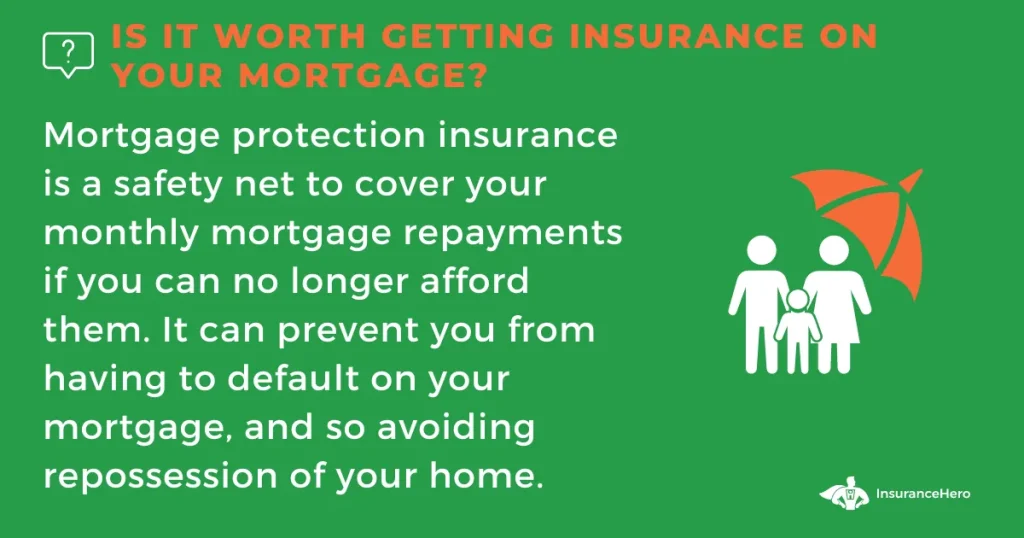Life Insurance vs Mortgage Insurance

Deciding which type of insurance is right for you can be tricky. Life insurance and mortgage life insurance overlap, but we’ll explain the different types of coverage to give you a clearer picture.
In our 2025 Life Insurance vs Mortgage Insurance guide, we’ll explore the difference between life insurance and mortgage life insurance and help you decide the most suitable one.
What Is Life Insurance?
In practice, the term “life insurance” refers to any form of insurance that pays a lump sum to the beneficiaries upon the policyholder’s passing.
This includes whole life insurance, term life insurance, and universal life insurance.
Generally speaking, life insurance is designed to provide financial security for your family in the event of your death. It can also be used to cover funeral costs or other expenses associated with an unexpected death.
The commonality of all life insurance is that it is purely altruistic in nature—the policyholder is just protecting the people they leave behind.
Before looking at mortgage life insurance, let’s quickly summarise the three main types of mortgages.
Whole Life Insurance
Whole life insurance is a type of life insurance policy that ends on your death and provides you with a guaranteed payout to your family or other nominated beneficiaries.
Some of the main advantages of whole life insurance include its no maturity date or endpoint, so unlike many other types of investments, it’s guaranteed to pay out when you die.
As long as premiums are paid on time, you can be sure that your loved ones will reap the full benefit.
Universal Life Insurance
Universal life insurance is similar to whole life insurance in that it offers lifelong protection and a guaranteed death benefit but with some key differences. Universal life combines savings and investment components into one policy, allowing you to set aside money each month while earning interest on those funds over time.
Universal life insurance also allows you to adjust your premium payments or death benefits depending on your changing needs throughout your lifetime.
Term Life Insurance
This is where we intersect with mortgage life insurance. Term life insurance is a type of coverage that provides protection for a set period of time. It’s generally the least expensive form of life insurance, as premiums are based on your current age and health status.
This coverage is usually bought to help protect dependent children or pay off any outstanding debts in the event of death. This would include mortgages or loans taken out during your lifetime.
Term life can be broken down further to level and decreasing term, the latter of which has become popular with mortgage life insurance. We’ll cover both levels of term life insurance shortly when we look at mortgage life insurance specifically.
Help Protect Your Family’s Future, Compare The Top UK Insurers. Find Your Cheapest Quote ⏱ Takes About 60 Seconds.

Other Types of Life Insurance Cover
You’ll also find other types of life insurance tailored to specific needs, such as joint health insurance, family income benefit and over-60s plans. These are often considered niche products and may only sometimes be suitable for everyone’s needs.
There’s also supplemental coverage such as critical illness, long-term care and disability insurance that can be added to life insurance policies. These are often used to protect those at higher risk of certain conditions or illnesses.
There’s also supplemental coverage such as critical illness, long-term care and disability insurance that can be added to life insurance policies. These are often used for additional protection for those at higher risk of certain conditions or illnesses.
Do You Need It?
You might be asking, if I don’t have a mortgage, do I really need life insurance?
If you are a young single person with no dependents, the answer is probably not. But if you have anyone around you who relies on your income, it should be part of your overall financial plan.
Even if you don’t have a mortgage, you will probably have other financial commitments, be it rent, credit cards, or car payments. In the event of your death, these debts will still need to be paid off.
The lump sum paid out in the event of your death will also pay for your funeral and ensure your dependents aren’t struggling without the income you once provided.
The most important thing to remember when considering life insurance is that it’s an investment in your dependents’ future and ultimately affords them protection and financial security.

What Is Mortgage Life Insurance?
There are two types of mortgage life insurance – level term and decreasing term, but the latter is usually associated with the term mortgage life insurance.
Let’s start with the less common one.
Level Term Mortgage Protection Life Insurance
The term ‘level’ defines this type of life insurance. The amount of coverage stays the same throughout the term.
For instance, if you have a mortgage of £300,000 and opt for ‘level’ cover, the policy will pay out £300,000 in the event of your death. The term will also be fixed, so you know the length of coverage you’re paying, i.e. 15, 20 or 25 years.
One of the big advantages of Level Term, for your beneficiaries at least, is that the more your mortgage gets paid off, the more money they have left to use as they please. Another benefit is knowing exactly what they will get – in our case above, the £300,000.
Level-term mortgage life insurance has a couple of downsides; the first is that it is generally more expensive than decreasing term. The other is that you need to take inflation into account. That £300,000 might not have the same buying power in 15 or 20 years.
However, there are index-linked mortgage protection policies which protect against inflation. Your premiums will rise, but the payout will remain in line with the inflation rate.
Decreasing Term Mortgage Protection Life Insurance
No prizes for guessing why this type of plan is called decreasing term. It pays out a decreasing amount over the term of the policy. As mentioned, decreasing term life insurance is commonly associated with mortgage protection.
Let’s take that hypothetical £300,000 mortgage again. If you were to opt for a 25-year decreasing term policy, the payout would decrease in line with your mortgage balance. So, if three years down the line, your balance was £250,000, the policy would pay out this amount upon your death.
It is much cheaper than a level term and, as such, very popular—especially for first-time buyers. The main downside is that it only covers your mortgage, so while your dependents might still retain the house, additional funds won’t be left to help with other costs.
If you have an interest-only mortgage, level-term insurance is a better option, as the amount of debt will stay the same over the term.
What Is Mortgage Payment Protection Insurance?
Mortgage Payment Protection Insurance (MPPI) and Mortgage Life Insurance often get confused.
As we’ve ascertained, Mortgage Life insurance covers your mortgage if you die. In contrast, MPPI ensures your mortgage is paid if you can no longer work and earn a living. Your mortgage payments will be covered until you can return to work.
You can be insured for three levels – ‘accident and sickness’, ‘unemployment,’ or a combination of the two. The premiums for mortgage payment protection insurance will vary depending on the level of insurance you take out, your salary and mortgage size.
However, MPPI won’t be helpful to your dependents should you die, only to you.
Picking the Right Life Insurance Cover for You
Hopefully, this guide has clarified the differences between life insurance, mortgage life insurance and mortgage protection insurance. We know it can be a little confusing initially, leading some people to delay protecting their families.
While life insurance and mortgage life insurance provide financial security, they differ in their purpose of protection. Life insurance offers a means of providing financial compensation to someone’s dependents in the event of death.
On the other hand, mortgage life insurance provides a lump sum payment that helps cover the balance of a mortgage if the owner dies before it is paid off. The two types of insurance are designed with different objectives yet can offer equally essential protections.
We are certainly not encouraging you to rush; choosing the proper mortgage protection or life insurance isn’t something that should be taken lightly, but it’s best to get started as soon as possible, comparing products and speaking to the right people.
You can start the process and get a no-obligation free quote in less than a minute, so you can get the ball rolling. If you have any more questions or would like to speak with an advisor, contact us today, and we’ll happily answer any queries you may have.
Mortgage Insurance vs Life Insurance FAQs
Is it mandatory to have life insurance for a mortgage?
It can be tempting not to purchase life insurance if you are buying a home and putting a mortgage down. However, while it’s not obligatory, getting a life insurance policy when taking out a mortgage is generally strongly advised and is often the best way to secure your family’s future after you have passed away.
With mortgage life insurance, your dependents will have peace of mind knowing that their home will still be provided for, even in times of tragedy.
Having life insurance coverage means that in case of an untimely death, those who are left behind would be able to stay in the family home without worry or financial burden. This allows them to stay together as a family unit during such difficult times and find solace in the place they call home.
Does mortgage insurance cover death?
As morbid as it may sound, yes, this is exactly what mortgage protection life insurance does. In the event of your death, the policy can be used to pay off the remaining balance on what is probably your largest overhead expense – your home.
Do I need life insurance or mortgage life insurance?
As they are pretty much one and the same thing, you shouldn’t need to choose between one and the other. A term life insurance policy will provide a lump sum to your dependents, and they can choose to use it to pay off the remainder of your mortgage loan or for any other purpose they wish.
Do I still need life insurance after I pay off my mortgage?
This will depend on your circumstances; often, by the time your mortgage is paid off, you might be retired or financially secure, in which case, life insurance may not be necessary. Still, many people do take out a small life insurance policy to cover funeral costs or maybe provide grandchildren with a small amount of cash to start their adult lives.
Steve Case is a seasoned professional in the UK financial services and insurance industry, with over twenty years of experience. At Insurance Hero, Steve is known for his ability to simplify complex insurance topics, making them accessible to a broad audience. His focus on clear, practical advice and customer service excellence has established him as a respected leader in the field.


